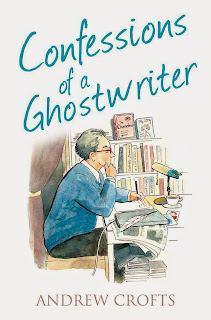“How
about ‘The Greatest F***ing Love Story?” the publisher suggested as we brainstormed
possible titles for an erotic love story that I had ghostwritten for an
anonymous European lady, hereafter known simply as “Penny”.
The
book had worked out well and one of the biggest agents in London had agreed to take it round the
publishers for us. The reactions were dramatic. Some were shocked by the
contents and thought it too strong for the general trade market, others were
worried that the general public wouldn’t like the fact that it was non-fiction
rather than fiction, (they were all at that stage scrambling over one another
to find the “next 50 Shades of Grey”). We received some offers but they didn’t
seem to reflect the value which we believed the book could have. The advances
on offer weren’t dramatic enough to distract us from the paltry percentages we
would earn in royalties.
Penny
and James, (her lover), decided we should take control of the project ourselves
by working with the new and dynamic selective partnership publisher, Red Door,
which is the baby of Clare Christian, an editor whose previous venture was The
Friday Project, (now part of HarperCollins). We also felt we needed to address
the “discoverability” side of the challenge right from the beginning. To that
end we hired Midas, probably the country’s best known publishing PR and
marketing consultancy, and they worked with Clare on the design and packaging
of the book right from the start. We now had all the elements of a traditional
publisher in place, but without the overheads of a huge Thames-side building
and everything that is required to support such an edifice.
The
marketing gurus within Midas liked the idea of “The Greatest F***ing Love Story”
as well – it did after all sum the story up at several levels – but were
fearful that, even with the asterisks, it would frighten off too many of the
potential retailers. More titles were bandied around until we settled on
“Chances”.
With the book due to be published in February the mighty
Midas marketing machine fired into action as soon as Christmas was out of the
way and I found myself writing articles and doing a succession of interviews to
promote the book, culminating in an encounter with Claudia Winkleman on her late
night Radio2 Arts Show.
Whenever I mentioned to anyone that
I was going to be meeting Miss Winkleman I always received the same response -
“Oh, I love Claudia Winkleman”.
It didn’t seem to matter what age
or gender the person was, or whether or not they were likely to be fans of
reality shows like “Strictly” or cultural offerings like “Film Night”, her
puppyish glamour had somehow worked on all of them. It appears the woman is
fast-tracking towards being a national treasure. What, I wondered, could be the
secret of this magical spell she was casting over the nation?
Listening to so many paeans of adoration
rang alarm bells. How could the reality possibly live up to this awesome
reputation? Was I going to have to report back to all these devoted admirers
that in reality the woman was a monstrous confection of insincerity and vanity,
propped up by armies of sycophants and hangers on? Could she possibly live up
to everyone’s heady expectations?
I have to report that fifteen
minutes in a studio with Miss Winkleman is like being enveloped in a
particularly cosy nuclear explosion, flattened by a steamroller of charm and
wit so overwhelming that you barely notice the pain when she skewers you with
an unexpected stab of journalistic enquiry. She opened by caressing the book
lovingly, purring with pleasure at the production job Red Door had done on it,
and continued in much the same vein from then on. All in all it was the most
exhilarating and enjoyable quarter of an hour I can remember ever spending with
a total stranger. I felt like we had been friends for ever and that, I suspect,
is the secret of Miss Winkleman’s magic.
Chances is the true story of the most
erotic of love affairs, of the most intense and rewarding relationship possible
between a man and woman – a relationship that blossomed out of heartbreak.
“What”
the cover asks “if your first love was your soulmate and perfect sexual partner
but you made the mistake of letting them go? What if you were reunited with
that first love after fifteen years of unhappiness and you were then able to
fulfil every romantic and erotic dream you had ever had?”





.JPG)

.JPG)
